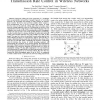Free Online Productivity Tools
i2Speak
i2Symbol
i2OCR
iTex2Img
iWeb2Print
iWeb2Shot
i2Type
iPdf2Split
iPdf2Merge
i2Bopomofo
i2Arabic
i2Style
i2Image
i2PDF
iLatex2Rtf
Sci2ools
INFOCOM
2010
IEEE
2010
IEEE
A Framework for Joint Network Coding and Transmission Rate Control in Wireless Networks
—Network coding has been proposed as a technique that can potentially increase the transport capacity of a wireless network via processing and mixing of data packets at intermediate routers. However, most previous studies either assume a fixed transmission rate or do not consider the impact of using diverse rates on the network coding gain. Since in many cases, network coding implicitly relies on overhearing, the choice of the transmission rate has a big impact on the achievable gains. The use of higher rates works in favor of increasing the native throughput; however, it may in many cases work against effective overhearing. In other words, there is a tension between the achievable network coding gain and the inherent rate gain possible on a link. In this paper1 , our goal is to drive the network towards achieving the best trade-off between these two contradictory effects. Towards this, we design a distributed framework that (a) facilitates the choice of the best rate on each link w...
Related Content
| Added | 28 Jan 2011 |
| Updated | 28 Jan 2011 |
| Type | Journal |
| Year | 2010 |
| Where | INFOCOM |
| Authors | Tae-Suk Kim, Serdar Vural, Ioannis Broustis, Dimitris Syrivelis, Srikanth V. Krishnamurthy, Thomas F. La Porta |
Comments (0)

